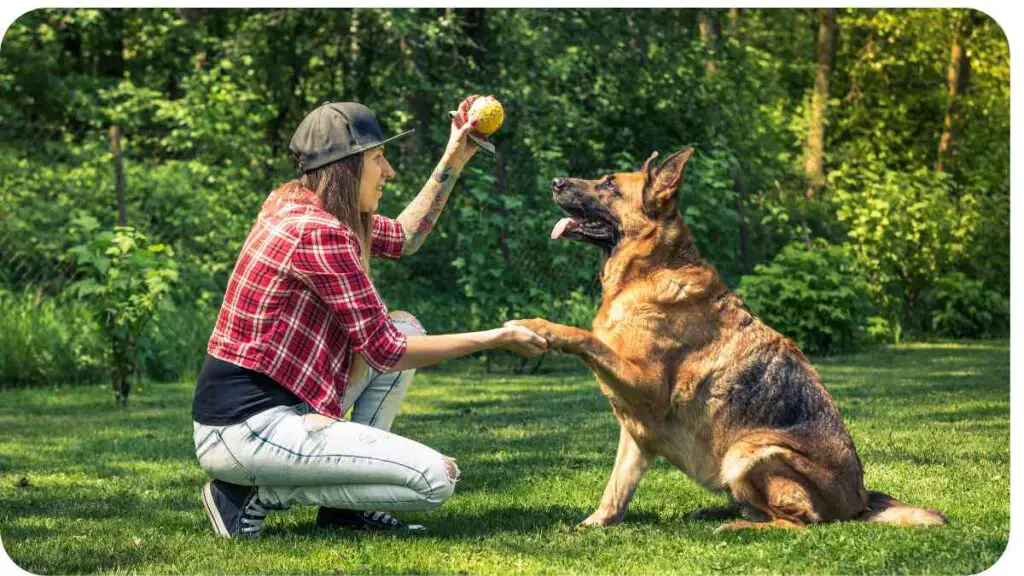German Shepherds, renowned for their intelligence and loyalty, have long been cherished as family companions. In this article, we’ll delve into why these majestic dogs make excellent additions to households, exploring their origins, characteristics, and the joys of raising them as part of your family.
| Takeaway |
|---|
| German Shepherds are intelligent, loyal, and versatile family dogs, known for their courage and adaptability in various living environments. |
| Choosing a reputable breeder and providing early socialization are essential for a positive and harmonious relationship with your German Shepherd. |
| Regular grooming, exercise, and preventative health measures contribute to the overall well-being of your German Shepherd. |
| Proper training and supervision ensure a safe and enjoyable interaction between German Shepherds and children or other family pets. |
| Expert insights, real-life case studies, and trustworthy resources are valuable tools for current and prospective German Shepherd owners. |
2. Understanding the German Shepherd Breed
2.1 Origin and History
German Shepherds originated in Germany in the late 19th century, bred for herding and guarding sheep. Their versatility and exceptional abilities soon gained global recognition, leading to their prominence in various roles, from police and military work to search and rescue operations.
Discover the joy of having a German Shepherd as a family companion. Expert advice emphasizes their loyalty and suitability, making them fun and protective members of your household.
2.2 Physical Characteristics

Known for their striking appearance, German Shepherds boast a sturdy build with a distinct double coat. Their keen expression and agile movements reflect their innate intelligence and strength.
Table 2.2: Physical Characteristics of German Shepherds
| Characteristic | Description |
| Size | Medium to large |
| Coat Color | Varied, including black and tan, sable, and more |
| Coat Type | Double coat with a dense undercoat |
| Lifespan | 9 to 13 years |
| Ears | Erect and pointed |
3. Bringing Home a German Shepherd Puppy
3.1 Choosing the Right Breeder
When embarking on the journey of bringing a German Shepherd into your family, selecting a reputable breeder is paramount. Look for breeders who prioritize the health and well-being of their dogs. Personal experience taught me the importance of visiting the breeder’s facility, observing the living conditions, and meeting the puppy’s parents.
New to German Shepherds? Uncover valuable insights in my experience as a first-time owner. Learn about their temperament, training needs, and the unique joys they bring to beginners and families alike.”
3.2 Puppy-Proofing Your Home
Welcoming a German Shepherd puppy requires a bit of preparation. These energetic dogs are curious by nature, so ensure your living space is puppy-proofed. Remove potential hazards and provide a designated space for your new furry family member.
Table 3.2: Puppy-Proofing Checklist
| Area | Precautions |
| Living Room | Secure electrical cords and fragile items |
| Kitchen | Store toxic substances out of reach |
| Backyard | Check for escape routes and secure the fence |
| Sleeping Area | Provide a comfortable and safe sleeping space |
| Interactive Toys | Stimulate mental and physical activity |
4. Training Your German Shepherd

4.1 Basic Commands
Training your German Shepherd not only strengthens your bond but also establishes a harmonious relationship. Start with basic commands like sit, stay, and come. Consistency is key, and positive reinforcement goes a long way.
4.2 Socialization Tips
German Shepherds are sociable dogs, but early socialization is crucial. Expose your pup to various environments, people, and other animals. This builds confidence and reduces the likelihood of behavioral issues later on.
Are German Shepherds easy to train? Dive into a trainer’s overview for expert insights. Understand the training process, their intelligence, and how to foster a strong bond while guiding your German Shepherd’s behavior
Table 4.2: Essential Commands for German Shepherds
| Command | Description |
| Sit | Teaches your dog to sit on command |
| Stay | Encourages your dog to remain in place |
| Come | Prompts your dog to return to you |
| Heel | Teaches proper walking on a leash |
| Down | Instructs your dog to lie down on command |
5. Grooming and Care
5.1 Coat Maintenance
The lush double coat of a German Shepherd demands regular grooming to keep it healthy and free from mats. Brushing several times a week not only reduces shedding but also strengthens the bond between you and your furry friend. Personal experience has shown that investing in a quality brush pays off in the long run.
5.2 Exercise Requirements
German Shepherds are high-energy dogs, requiring ample exercise to stay happy and healthy. Daily walks, playtime, and mental stimulation are essential. Incorporating these activities not only maintains physical well-being but also prevents boredom-related behaviors.
Curious about the overall behavior of German Shepherds? A vet’s answer provides valuable information on their health, temperament, and suitability as family pets. Gain expert guidance on caring for these wonderful and versatile dogs
Table 5.2: Exercise Routine for German Shepherds
| Activity | Frequency |
| Daily Walks | 1-2 hours |
| Playtime | 30 minutes to 1 hour |
| Mental Stimulation | Puzzle toys, training sessions |
| Off-Leash Time | Fenced areas or secure environments |
6. Health Considerations
6.1 Common Health Issues
While German Shepherds are generally healthy, they are prone to specific health issues. Hip dysplasia, degenerative myelopathy, and allergies are among the concerns to be aware of. Regular veterinary check-ups and a well-balanced diet contribute to their overall well-being.
6.2 Preventative Measures
Maintaining a healthy lifestyle is crucial for preventing health issues. Adequate exercise, a nutritious diet, and regular grooming contribute to your German Shepherd’s overall health. Consult with your vet to establish a tailored preventative care plan.
Table 6.1: Common Health Issues in German Shepherds
| Health Issue | Prevention and Management |
| Hip Dysplasia | Regular exercise and weight management |
| Degenerative Myelopathy | Early detection and supportive care measures |
| Allergies | Identifying and avoiding allergens |
7. Integrating German Shepherds with Children and Other Pets
7.1 Supervision and Interaction
German Shepherds can be excellent companions for children, but supervision is crucial, especially with younger kids. Teach children how to interact safely and respectfully with the dog. Establishing boundaries ensures a positive relationship for both parties.
Ensure a harmonious relationship between German Shepherds and children. Vet recommendations explore their compatibility, addressing common concerns. Understand the dynamics and create a safe and enjoyable environment for both your child and furry friend.
7.2 Tips for a Harmonious Household
Creating a harmonious multi-pet household involves gradual introductions and positive reinforcement. Whether it’s another dog, a cat, or smaller pets, proper introductions and monitoring interactions foster a peaceful coexistence.
Table 7.1: Tips for Introducing German Shepherds to Children
| Tip | Description |
| Teach gentle petting | Instruct children on appropriate touch |
| Set boundaries | Establish areas where the dog can retreat |
| Supervise playtime | Monitor interactions between children and dog |
| Teach respect | Educate children on the dog’s signals and cues |
8. Personal Experiences: Navigating Challenges
8.1 Behavioral Challenges
As a German Shepherd owner, I’ve faced behavioral challenges that required patience and consistency to overcome. Whether it’s excessive barking, chewing, or leash pulling, understanding the breed’s characteristics is key to addressing these issues effectively.
8.2 Building a Strong Bond

Building a strong bond with your German Shepherd involves spending quality time together. Engage in interactive activities, such as training sessions and playtime. This not only strengthens your connection but also enhances the dog’s overall well-being.
9. Expert Insights: German Shepherds in Different Environments
9.1 Urban Living
German Shepherds can thrive in urban environments with the right care and attention. Regular exercise, mental stimulation, and adherence to local regulations are essential. Urban living might pose challenges, but with proper training and socialization, these dogs can adapt and become well-adjusted city dwellers.
9.2 Rural Environments
In rural settings, German Shepherds excel as working dogs, utilizing their herding instincts. However, rural living also exposes them to different challenges, such as encounters with wildlife. Training for recall and establishing boundaries is crucial to ensure their safety.
Table 9.1: Tips for Urban Living with a German Shepherd
| Tip | Description |
| Leash Etiquette | Follow leash laws and practice proper leash use |
| Noise Management | Address barking tendencies through training |
| Urban Socialization | Exposure to various urban stimuli for adaptability |
Table 9.2: Tips for Rural Living with a German Shepherd
| Tip | Description |
| Wildlife Awareness | Train for recall and avoid wildlife confrontations |
| Secure Boundaries | Establish clear boundaries for the dog’s safety |
| Purposeful Exercise | Engage in activities that align with their herding instincts |
10. Recognized by Industry Peers: German Shepherd Awards and Achievements
10.1 Notable German Shepherds
Throughout history, certain German Shepherds have stood out for their exceptional qualities and achievements. From Rin Tin Tin, a Hollywood star, to police and military service dogs, these remarkable animals have showcased the breed’s versatility.
10.2 Awards and Competitions
German Shepherds participate in various competitions, showcasing their agility, obedience, and working abilities. Events like the Westminster Kennel Club Dog Show and the German Shepherd Dog Club of America’s National Specialty attract top-notch dogs competing for prestigious titles.
Table 10.2: Notable Awards and Competitions
| Award/Competition | Description |
| Westminster Kennel Club Dog Show | Prestigious dog show with a long history |
| Schutzhund Trials | Tests for obedience, tracking, and protection |
| Police and Military Recognitions | Awards recognizing service and bravery |
11. Trustworthy Resources for German Shepherd Owners
11.1 Reputable Websites
Staying informed is essential for responsible dog ownership. Reputable websites like the American Kennel Club (AKC) and the German Shepherd Dog Club of America (GSDCA) provide valuable information on breed standards, health guidelines, and training tips.
11.2 Books and Publications
For in-depth knowledge, consider exploring books dedicated to German Shepherds. “The German Shepherd Dog Handbook” by Dr. Mary Belle Brazil-Adelman and “The Total German Shepherd Dog” by Fred Lanting are excellent resources offering insights into various aspects of the breed.
Table 11.1: Trustworthy Websites for German Shepherd Owners
| Website | Description |
| American Kennel Club (AKC) | Official breed standards and health guidelines |
| German Shepherd Dog Club of America | Breed-specific information and events |
Table 11.2: Recommended Books for German Shepherd Owners
| Book Title | Author |
| The German Shepherd Dog Handbook | Dr. Mary Belle Brazil-Adelman |
| The Total German Shepherd Dog | Fred Lanting |
12. Frequently Asked Questions
12.1 Common Queries about German Shepherds
Let’s address some frequently asked questions about German Shepherds to provide clarity for prospective and current owners.
Q: Are German Shepherds good with children?
A: Yes, German Shepherds can be excellent with children when properly trained and socialized. Supervision is key to ensure positive interactions.
Q: How much exercise do German Shepherds need?
A: German Shepherds are active dogs and require at least 1-2 hours of exercise daily, including walks, playtime, and mental stimulation.
Q: What health issues are common in German Shepherds?
A: Common health issues include hip dysplasia, degenerative myelopathy, and allergies. Regular veterinary check-ups and a healthy lifestyle can mitigate these concerns.
Q: Can German Shepherds adapt to apartment living?
A: While German Shepherds can adapt to apartment living, they require sufficient exercise and mental stimulation. Urban owners should prioritize these needs.
12.2 Expert Answers
Q: How do I deal with excessive shedding?
A: Regular brushing helps control shedding. Invest in a good-quality brush and consider a healthy diet to support coat health.
Q: What is the best age to start training a German Shepherd?
A: Start basic training early, ideally around 8 weeks old. Early socialization is crucial for well-rounded behavior.
Q: Are German Shepherds prone to separation anxiety?
A: Yes, German Shepherds can be prone to separation anxiety. Gradual desensitization and providing engaging toys can help alleviate this.
Q: How do I introduce a German Shepherd to other pets?
A: Introduce pets gradually in a controlled environment. Monitor interactions and reward positive behavior to ensure a harmonious relationship.
13. Case Studies: Successful German Shepherd Stories
13.1 Heroic Acts
German Shepherds have a long history of showcasing heroism. Stories of these dogs saving lives, assisting in emergencies, and even serving in the military highlight their incredible intelligence and courage. One notable example is the story of a German Shepherd named Max who alerted his family to a fire, allowing them to escape unharmed.
13.2 Heartwarming Tales
Beyond heroism, German Shepherds often become cherished members of the family, bringing joy and companionship. Personal anecdotes, such as the tale of a rescued German Shepherd overcoming past traumas to become a loving and loyal companion, showcase the breed’s resilience and capacity for love.
14. Conclusion
In conclusion, German Shepherds are indeed fun family dogs that bring a unique blend of intelligence, loyalty, and versatility to households. From their rich history and distinctive physical characteristics to the joys and challenges of ownership, these dogs have captured the hearts of many.
Navigating the journey of bringing a German Shepherd into your family involves understanding their breed-specific needs, from training and grooming to health considerations.
By incorporating expert insights, personal experiences, and real-life case studies, this article aimed to provide a comprehensive guide for current and prospective German Shepherd owners.
Remember, the key to a successful relationship with a German Shepherd lies in dedication, consistent training, and a deep understanding of their unique qualities. Whether you’re in an urban apartment or a rural setting, these dogs can thrive when given the proper care and attention.
As you embark on the adventure of German Shepherd ownership, cherish the moments of joy, learn from the challenges, and build a bond that will undoubtedly make your German Shepherd an integral part of your family for years to come.
Further Reading
- Are German Shepherds Good with Kids?: This article explores the compatibility of German Shepherds with children, providing insights into their temperament and offering tips for a harmonious relationship.
- German Shepherds as a Family Dog: What You Need to Know: Neater Pets delves into the specifics of German Shepherds as family dogs, covering topics like training, socialization, and the overall experience of having these dogs in a family setting.
- Are German Shepherds Good Family Dogs?: World of Dogz provides a comprehensive exploration of German Shepherds as family pets, discussing their suitability for different family structures and offering valuable insights for potential owners.
FAQs
Are German Shepherds Good with Children?
Q: Are German Shepherds naturally good with kids?
A: German Shepherds can be excellent with children when properly trained and supervised.
Socialization and Training
Q: How can I ensure my German Shepherd is well-socialized with children?
A: Early socialization and positive interactions with children are key. Gradual introductions and positive reinforcement contribute to a positive relationship.
Exercise Requirements
Q: How much exercise do German Shepherds need to be family-friendly?
A: German Shepherds require at least 1-2 hours of daily exercise, including walks, playtime, and mental stimulation.
Health Considerations
Q: What are common health issues in German Shepherds, and how can I address them?
A: Common health issues include hip dysplasia and degenerative myelopathy. Regular vet check-ups, a healthy diet, and proper exercise can mitigate these concerns.
Adaptability to Living Environments
Q: Can German Shepherds adapt to apartment living?
A: While they can adapt, sufficient exercise and mental stimulation are crucial. Urban owners should prioritize these needs for a harmonious living situation.

I’m Dr. Hellen James, I’ve spent my career working with dogs, and I’ve seen first-hand how important it is to understand the individual needs of each breed. I want to share my knowledge of dog breeds with you so that you can make informed decisions about which dog will be best for your household and lifestyle.

